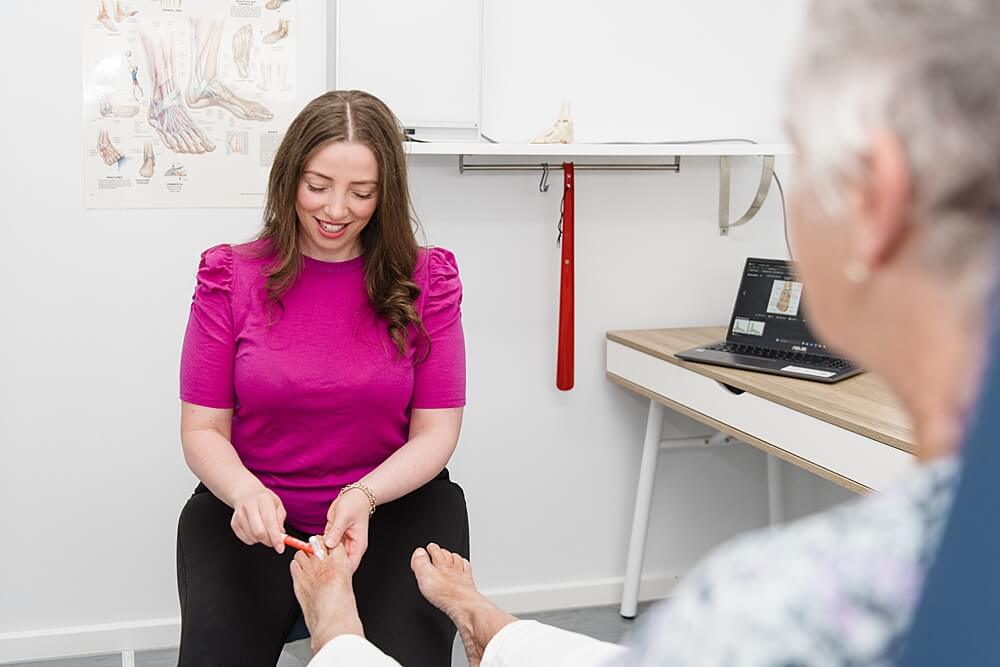Learn the advantages of seeing the same practitioner in the Podiatry private practice setting.
What is a continuity of care?
Continuity of care in private podiatry practices offers several distinct advantages, contributing to both the practitioner’s and the patient’s experience. Private podiatrists working at Highett Podiatry can leverage the benefits of continuity of care to enhance the quality of service, build strong patient relationships, and create a more sustainable and successful practice.
At Highett Podiatry, we are one of the largest practices in the Bayside and South eastern suburbs of Melbourne, currently with nine podiatrists on staff, and two who we expect to return from leave this year. Many of our podiatrists have been working with us for many years as with our support staff. You may miss some of our staff for a few months this year as six of our staff have become eligible for long service leave over the last two years. We are proud of this as we feel it is a great testament to our work place.
We are excited to welcome Katrina Challis on staff, who has worked in her previous clinic for 13 years. Katrina understands the value of continuity of care, making her decision to leave her last place of practice difficult. Katrina is a resident of Mentone who has three young children and has made the leap to join a practice closer to home. Katrina will be sadly missed at her previous place of practice in Camberwell, and all of us at Highett Podiatry look forward to having Katrina on staff for the next 20 years! Or MORE!
Our staff retention at Highett Podiatry is a great reflection of the culture of our practice, our high level of management and our incredible team, both at our front desk and in the consult rooms.
With our large staff, we can and will try to book our patients ongoing with their preferred practitioner, and if this is not possible, we will book with a podiatrist who is of similar personality, experience and knowledge.
We welcome all feedback, and if at any time you are not completely satisfied with the service provided to you, we encourage you to get in contact with our management team.
WHY IS CONTINUITY OF CARE SO IMPORTANT?
Continuity of care plays a pivotal role in the delivery of effective and patient-centered healthcare.
Continuity of care is important for several reasons:
Personalised Patient-Centred Approach
- In a private podiatry practice, practitioners can establish deep, personalised connections with their patients. Continuity of care allows for a comprehensive understanding of each patient’s medical history, lifestyle, and individual needs.
- The practitioner can tailor treatment plans based on the unique circumstances of each patient, fostering a patient-centred approach that goes beyond standardised care.
Building Trust and Rapport
- The consistent interaction between the podiatrist and the patient in a private practice setting promotes the development of trust and rapport. Patients often feel more comfortable discussing their concerns, asking questions, and actively participating in their care when they have an established relationship with their podiatrist.
- Trust is a critical factor in healthcare, and the private setting allows podiatrists to invest time in building strong connections with their patients, leading to increased patient satisfaction.
Enhanced Communication
- Continuity of care facilitates ongoing and effective communication between the podiatrist and the patient. Regular check-ups and follow-up appointments enable the podiatrist to monitor the patient’s progress, address any concerns promptly, and make necessary adjustments to the treatment plan.
- Open communication promotes a collaborative approach to healthcare, where patients are more likely to share relevant information about their foot health, enabling the podiatrist to provide more accurate and ensuring seamless podiatry care.
Preventive Care and Early Intervention
- Private podiatry practices can emphasise preventive care and early intervention strategies due to the sustained relationships with patients. Regular check-ups and ongoing monitoring enable the podiatrist to identify potential issues before they escalate into more significant problems.
- Early detection and intervention not only improve patient outcomes but also contribute to the overall efficiency of the practice by reducing the need for extensive treatments and interventions.
Treatment Adherence and Patient Education
- Continuity of care fosters a sense of commitment and responsibility on the part of the patient. Patients are more likely to adhere to prescribed treatments and follow preventive measures when they have an established relationship with their podiatrist.
- Private practitioners can invest time in patient education, explaining the importance of foot health, demonstrating proper care techniques, and providing ongoing guidance. This investment in patient care education contributes to better treatment adherence and long-term health outcomes.
Flexibility and Individualised Scheduling
- Private podiatry practices often have more flexibility in scheduling appointments. This allows for unhurried consultations, ensuring that each patient receives the attention and time required for a thorough examination and discussion of their concerns.
- Individualised scheduling contributes to a more relaxed and patient-friendly environment, fostering a positive experience and reinforcing the value of continuity of care.
Brand Loyalty and Practice Growth
- Patients who experience the advantages of continuity of care in a private podiatry practice are likely to develop loyalty to the practitioner and the practice. Satisfied and loyal patients often refer friends and family, contributing to practice growth and sustainability
- Positive word-of-mouth marketing, combined with a reputation for personalised care, can enhance the practice’s standing in the community, attracting more patients and ensuring the long-term success of the private podiatry practice.
In conclusion, continuity of care is a cornerstone of success for private podiatry practices. The personalised, patient-centred approach, coupled with trust and effective communication development, creates a positive and supportive healthcare environment. These advantages lead to improved patient outcomes and contribute to the long-term viability and growth of the private podiatry practice.

